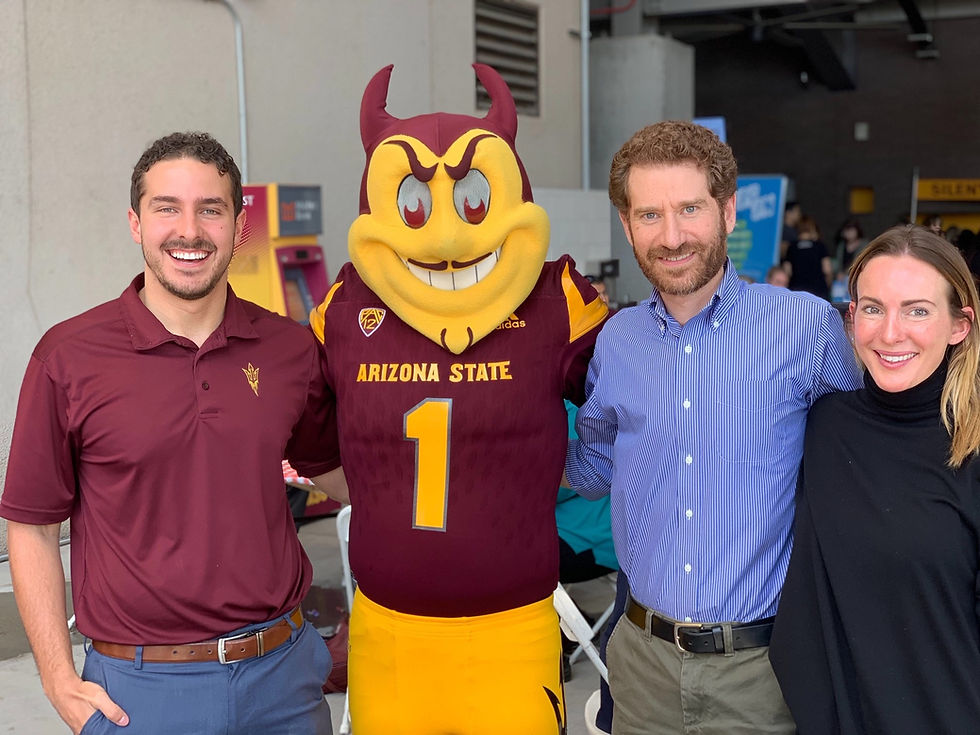Reflections of a University Innovation Fellow
- Lukas Wenrick
- Jul 9, 2019
- 3 min read
Updated: Dec 31, 2019
When I came out to Arizona State University to serve as a UI Fellow, I didn’t quite know what to expect. I had never even been to the university when I accepted my offer and wasn’t even sure what my day to day would look like. Yet, after 13 months of a roller coaster experience, I can definitively say that this has been the most gratifying professional experiences of my life. I've grown more during this short period of time than I ever thought possible.

I had the fortunate experience of having two bosses this year. I reported directly to Luke Tate, Executive Director and Associate Vice President of Opportunity Initiatives, while also serving underneath Jacqueline Smith, Executive Director and Associate Vice President of University Initiatives. This dual-reporting structure gave me flexibility to pursue projects in ways that might have been difficult otherwise. I supported nearly every project that Luke undertook (a portfolio consisting of everything from educational data collection to autonomous vehicles) while also working on projects with my colleagues within the Office of University Initiatives. Because Luke and Jacqueline were both tasked with moving the Universal Learning initiative forward, a project that became my primary initiative throughout the year, the reporting structure worked extremely well.

As mentioned, much of my time was spent moving the Universal Learning initiative forward. Throughout the year I have learned more about emerging educational concepts than I ever thought possible. I researched badges, digital credentials, income share agreements, bootcamps, prior learning assessments, alternative admissions pathways, blockchain, competency based education, and dozens of other topics. Horizon scanning, as we like to call it, allowed me to stay up to date on the most innovative concepts emerging around the world and assist ASU leadership in incorporating these concepts into the multiple iterations of universal learning. Over the course of a year, I prepared 3 major reports and presentations, produced over 50 deep dives, convened 40 university leaders, and prepared a catalog of universal learning initiatives with information from each of the academic units.

In addition to my work with Universal Learning, I was able to work closely with the Decision Center for Educational Excellence this year. In September I launched a student research team that ultimately prepared the Center’s first white paper on interventions to increase high school graduation rates. I’ve been able to iterate around this group to prepare a comprehensive internship structure that should be sustainable far after I leave. I have also had the unique opportunity of trying to secure additional funding for the Center. I’ve written numerous LOIs and successfully secured funding through a grant extension. Over the course of a few months, I went from not understanding how the grant process worked, to writing successful applications.

Lastly, my favorite part of being a University Innovation Fellow has been the opportunity to put together proposals on initiatives that interest me. I’ve worked on everything from Opportunity Zones, to Prison Education, to Alternative Teacher Preparation. My supervisors have empowered me to curate projects that can make the world a better place. What more could you ask for in a role?

I’ve loved every second of being a fellow and, luckily for me, I have the rare privilege of staying on for another year. The next few weeks will be spent transitioning our next group of Fellows into this role and saying goodbye to a few respected colleagues. As this first leg of my journey starts to wind down, I’m excited for another year of personal and professional growth at Arizona State University.
About the Author:
Lukas Wenrick spends his days working to develop innovative solutions to the most complex issues universities face. He does so to ensure that the most marginalized students may pursue an alternative trajectory than the one laid out by their zip code. He believes that universities and other educational enterprises have the duty to expand educational opportunity to as many individuals as possible and that excellence should be judged by the students that an institution includes, rather than those that it excludes.
Lukas holds a Master's of Education in Higher Education from the Harvard Graduate School of Education and a Bachelor of Arts in Social Science Education from Wright State University. His experiences at both an open access public university and an elite private institution inform the work he does every day. Currently, Lukas serves as a University Innovation Fellow at Arizona State University where he works to leverage the ASU enterprise to resolve educational and social inequities in the world.
If you'd like to know more about Lukas you can find him on the following sites:







































Comments